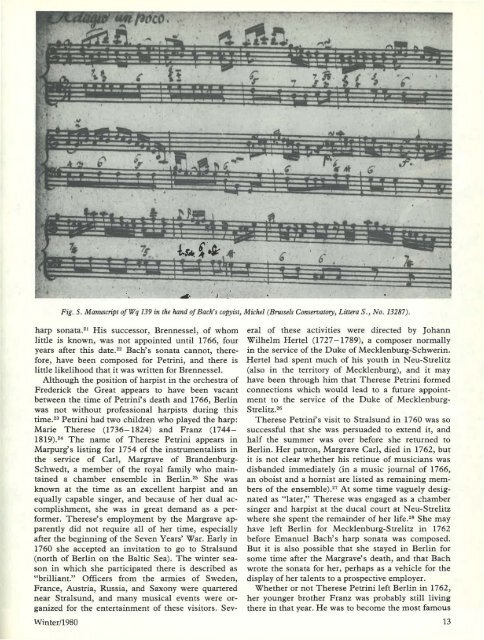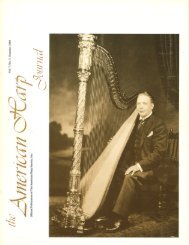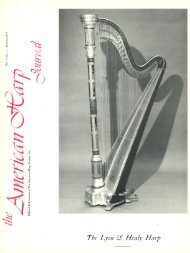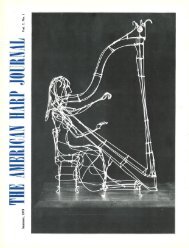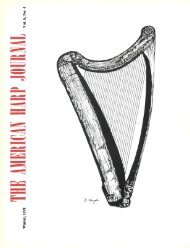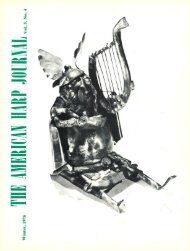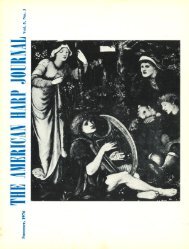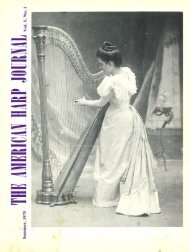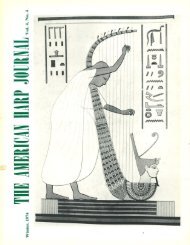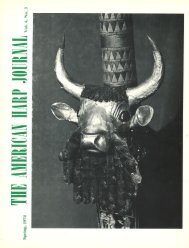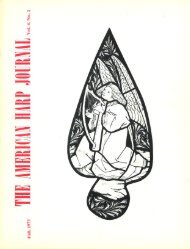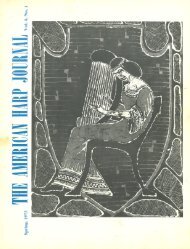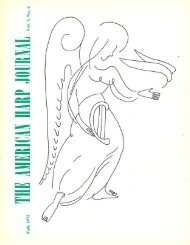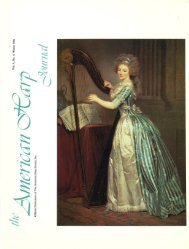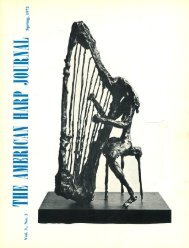You also want an ePaper? Increase the reach of your titles
YUMPU automatically turns print PDFs into web optimized ePapers that Google loves.
Fig. 5. Manuscript of Wq 139 in the hand of Bach's copyist, Michel (Brussels Conservatory, Littera S., <strong>No</strong>. 13287).<br />
harp sonata. 21 His successor, Brennessel, of whom<br />
little is known, was not appointed until 1766, four<br />
years after this date. 22 Bach's sonata cannot, therefore,<br />
have been composed for Petrini, and there is<br />
little likelihood that it was written for Brennessel.<br />
Although the position of harpist in the orchestra of<br />
Frederick the Great appears to have been vacant<br />
between the time of Petrini's death and 1766, Berlin<br />
was not without professional harpists during this<br />
time. 23 Petrini had two children who played the harp:<br />
Marie Therese (1736-1824) and Franz (1744-<br />
1819). 24 The name of Therese Petrini appears in<br />
Marpurg's listing for 1754 of the instrumentalists in<br />
the service of Carl, Margrave of Brandenburg<br />
Schwedt, a member of the royal family who maintained<br />
a chamber ensemble in Berlin. 25 She was<br />
known at the time as an excellent harpist and an<br />
equally capable singer, and because of her dual accomplishment,<br />
she was in great demand as a performer.<br />
Therese's employment by the Margrave apparently<br />
did not require all of her time, especially<br />
after the beginning of the Seven Years' War. Early in<br />
1760 she accepted an invitation to go to Stralsund<br />
(north of Berlin on the Baltic Sea). The winter season<br />
in which she participated there is described as<br />
"brilliant." Officers from the armies of Sweden,<br />
France, Austria, Russia, and Saxony were quartered<br />
near Stralsund, and many musical events were organized<br />
for the entertainment of these visitors. Sev-<br />
<strong>Winter</strong>/<strong>1980</strong><br />
eral of these activities were directed by Johann<br />
Wilhelm Hertel (1727-1789), a composer normally<br />
in the service of the Duke of Mecklenburg-Schwerin.<br />
Hertel had spent much of his youth in Neu-Strelitz<br />
(also in the territory of Mecklenburg), and it may<br />
have been through him that Therese Petrini formed<br />
connections which would lead to a future appointment<br />
to the service of the Duke of Mecklenburg<br />
Strelitz. 26<br />
Therese Petrini's visit to Stralsund in 1760 was so<br />
successful that she was persuaded to extend it, and<br />
half the summer was over before she returned to<br />
Berlin. Her patron, Margrave Carl, died in 1762, but<br />
it is not clear whether his retinue of musicians was<br />
disbanded immediately (in a music journal of 1766,<br />
an oboist and a hornist are listed as remaining members<br />
of the ensemble). 27 At some time vaguely designated<br />
as "later," Therese was engaged as a chamber<br />
singer and harpist at the ducal court at Neu-Strelitz<br />
where she spent the remainder of her life. 28 She may<br />
have left Berlin for Mecklenburg-Strelitz in 1762<br />
before Emanuel Bach's harp sonata was composed.<br />
But it is also possible that she stayed in Berlin for<br />
some time after the Margrave's death, and that Bach<br />
wrote the sonata for her, perhaps as a vehicle for the<br />
display of her talents to a prospective employer.<br />
Whether or not Therese Petrini left Berlin in 1762,<br />
her younger brother Franz was probably still living<br />
there in that year. He was to become the most famous<br />
13


